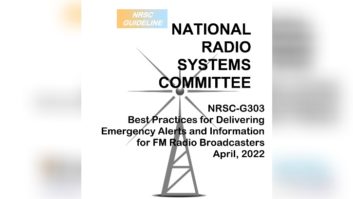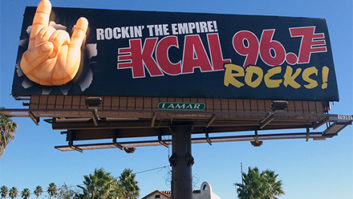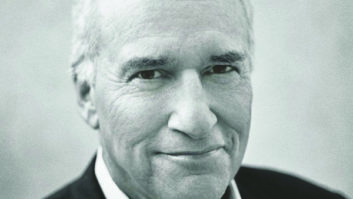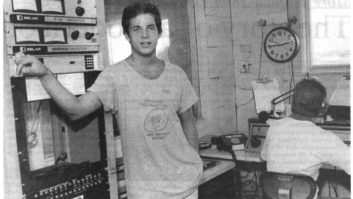Will the “social music” concept have legs?
Since June 30, Las Vegas radio stations KXLI(FM) and KYLI(FM) have been programmed entirely by their listeners. The music has been turned over to Jelli, a “social music service” with a crowdsourcing system that is driven by music choices from listeners who indicate their preferences via Web or smartphone.
By connecting through www.jelli.com/vegas or the Jelli phone app, listeners can influence what they want to hear from an online music library. They can push choices to the top of the list by using one of the “rockets” they receive daily, or kill someone else’s choice by dropping a “bomb” on it. A song could be pulled mid-play if enough voters say so. The service uses an automated announcer named T-Bone.

Jelli also has a presence on Facebook, Twitter and YouTube, where fans can interact with customized “stations” and with each other.
“Jelli is 100 percent user-controlled radio,” says Mike Dougherty, Jelli’s CEO. “We use a social media platform to attract listener interaction and to build a community amongst all of us.
“This approach engages younger listeners, getting them involved with radio brands because they program the stations themselves.”

Gerry Schlegel, President of LKCM
The result, he says, is “personal, listener-relevant radio” that speaks to listeners in demographics that are most savvy about social media.
Privately held Jelli, based in San Mateo, Calif., was founded in 2009 by Dougherty and Jateen Parekh; the following year they secured $7 million in funding from venture investment firms.
The only other full-time Jelli-formatted station at this writing is Brooke Communications station KSKR(FM), “Jelli 101.1,” in Roseburg, Ore., which flipped in October. A number of stations use the service in off-peak hours (see sidebar).Among companies that have experimented with it are CBS and Clear Channel. Jelli has a distribution deal with Westwood One, which represents its barter ad inventory. In September, Emmis Communications began five customized Jelli-run stations for listeners that connect via Facebook’s new music platform.
CBS station WYSP(FM) in Philadelphia used Jelli but dropped it when the station changed format to simulcast sports. Greater Media’s WBOS(FM) in Boston no longer uses Jelli; a manager at WBOS declined comment on the reason.
Based on its experience to date, Jelli believes it has proven that it can “drive strong ratings performance, time spent listening and user engagement.”

Mike Dougherty, CEO of Jelli
Why Jelli?
The owner of the two Las Vegas stations is LKCM Radio Group, based in Texas.
“Our Fort Worth station, KFWR 95.9 FM The Ranch, runs a listener-contact program called ‘Texas Music Interactive’ that encourages people to make music requests via text, phone and a listener chat wall,” says LKCM President Gerry Schlegel. “We also do a lot on Facebook, Twitter and YouTube, so social media is not a new concept for us.”
When LKCM decided to relaunch two struggling FM stations in Las Vegas — a city of 2 million with some 50 radio signals — it felt it had to cut through the clutter. (KVBE played dance, KHIJ was country.)
Schlegel decided to sign a deal with Jelli, which handles the music programming and listener contacts for its radio clients.
“We knew we had to make a splash, and yet we wanted to keep our staff and facilities down to a minimum,” he told Radio World. “Rather than go the satellite/syndicated route, we opted to go with Jelli.” Schlegel declined to say how the business relationship works, whether it’s based on fee, barter or some other arrangement, though he confirmed he has no ownership or investment in Jelli. He described the agreement as the result of a long negotiation.
Progress
The station chose call letters to align with the Jelli brand. Now KXLI is Jelli Rock 94.5, “100 Percent User-Controlled Rock Radio.” It draws from a catalogue of alternative and modern rock music. KYLI is Jelli Pop 96.7, “The New Beat of Las Vegas,” with top 40.
By using Jelli, LKCM Radio Group has been able to reduce its operations to a Las Vegas sales office plus its KXLI/KYLI transmitter site in Clark, Nev., northwest of Sin City. “We have sales people plus an engineer who maintains the transmitters,” Schlegel says. “We outsource our commercial production, and Jelli handles the programming.” Both companies are involved in promotion and advertising.
The group has been able to maintain ad sales and generate some media buzz.
“It’s called Jelli Radio, and it is addicting,” states a KLAS(TV) report posted online at 8NewsNow.com. “It is like a radio station and video game all rolled into one.”
Jelli Stations
The stations mentioned in the story rely on Jelli 24/7. These stations also use the service, generally in non-peak-hours.
KDOT (104.5) Reno, Nev.
KEEY (102.1) Minneapolis
KENR (107.5) Missoula, Mont.
KISN (96.7) Bozeman, Mont.
KNDE (95.1) College Station, Texas
KSMX (107.5) Clovis, N.M.
KTRS (104.7) Casper-Riverton, Wyo.
WBLI (106.1) Long Island, N.Y.
WCYY (94.3) Portland, Maine
WJYY (105.5) Gilford, N.H.
WKLS (Project 96.1) Atlanta
WKRL (100.9) Syracuse, N.Y.
WKZQ (96.1) Myrtle Beach, S.C.
WPST (94.5) Trenton, N.J.
WQPO (100.7) Harrisonburg, Va.
“Listener response to the format and user interface has been outstanding,” Schlegel said. “The engagement metrics are off the charts compared to regular terrestrial radio or other forms of Internet radio.” He said the stations have increased audience since the Jelli move, though he noted that one of them is a relatively new signal. “Share has doubled monthly for three consecutive months,” he said in November.
“Based on the last book,” Jelli’s Dougherty said earlier, “we have about 100,000 FM listeners split between both stations. As well, about 19 percent of our cume is listening via streaming media; that’s on top of our 100,000 off-air listeners. And 3 percent of our cume are chatting with each other and interacting, so the Las Vegas Jelli community is starting to grow.”
Schlegel is happy with the progress. “Jelli has created buzz for us in Las Vegas, and has got our listeners engaged,” he says. “It gives us something unique and timely in this market, and creates value for advertisers.”
As for songs being cut off in mid-play,he says it doesn’t happen often, in his listening experience: “It is alarming when you hear a song cut off, but rather amusing.”
Does the Jelli approach mark an important change in radio programming, or might this be a creature of passing interest in social media, to be replaced by something else in the not-distant future?
“Jelli is not about people’s interest in social media,” Schlegel replied. “It’s about giving people a sense of empowerment. Whether someone chooses to actively participate or passively listen, just knowing that you have the right to vote and program is very powerful and engaging. Listeners are personally vested in the brand and product development.
“Studies of ‘Generation Y,’ ‘Millennials,’ ‘Generation Next,’ whatever you want to call the emerging post-1970s generation, support there is not a ‘passing interest in social media,’” he said.
“Gen Y wants to be asked their opinion and give their input. Jelli allows them to do that, in real time, and build a community around their music.”












